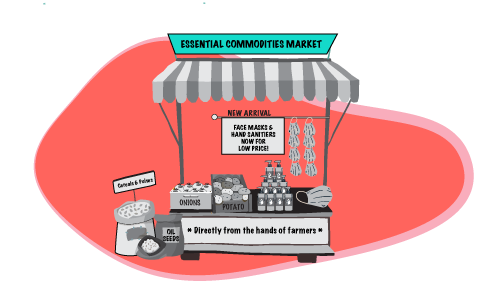Amendments to Essential Commodities Act

Background
The Essential Commodities Act, 1955 was enacted with the object of regulating supply and distribution of a whole range of “essential commodities” to make them available to consumers at fair prices. Pulses, oils, fertilizers, drugs, petroleum and related products are covered under this Act. The government also has powers to declare any commodity as “essential commodity” and fix the maximum retail price (MRP) of any product that it declares as “essential”.
Recent development
The Central government took recourse to this legislation in March 2020 by declaring face masks and hand sanitisers as “essential commodities” which became the basic mandatory items required to deal with the ongoing Covid-19 menace. By doing so, the government ensured that there are no large-scale hoardings and consequent price escalation of such commodities. Thereby the commodities are being made available to all sections of the society at reasonable price and quality.
Latest amendment
On 15th May 2020, the Finance Ministry announced its proposal to amend the Essential Commodities Act to deregulate certain food items and amend the law to enable more choice to farmers. A look at the key proposals / amendments:
- Cereals, edible oil, oilseeds, pulses, onions, and potato to be deregulated.
- It is proposed to remove any stock limits to processors and other value chain participants. Such stock limit shall be imposed only under exceptional circumstances and situations – natural calamities, famines etc which will lead to surge in prices. It is evident that this proposal has been put suggested consequent to the onset of Covid-19 which is deemed natural calamity.
- Removal of punitive measures such a preventive detention, confiscation of vehicles and attachment of properties of those suspected to be hoarders / black marketers. It is proposed to increase the penalty by 10 times in the event of any confiscation. This proposal is aimed to reducing the harassment on account of such stringent measures but for which conviction rate is minimal.
- Farmers to be given the liberty to directly sell their produce to Farmer producer organizations (FPOs), corporates, retailers and co-operative societies without having necessarily to go through the Agriculture Produce Market Committee (APMCs) a marketing Board set up by respective state governments. Hitherto, the first sale was allowed only at the “mandis” of the APMC by way of auction. The amendment proposes the removal of such restriction. Such removal will give farmers the bargaining powers. This proposed amendment will also ensure direct purchase from farmers and increased profits to them.
The Finance Minister announced the above proposals as amendments to the antique Act as part of the 20-lakh crore economic revival package for the country consequent to the Covid-19 pandemic. Several industry bodies and experts have welcomed these amendments saying that they were long overdue. Stating that the proposed amendments such as direct farmer dealing with buyers enables them to get best profits is a watershed decision in the agricultural reforms, it removes the intermediary menace for the farmers. However, there are also concerns of volatile fluctuations of price and inflationary situation for essential commodities such as food grains consequent to their de regulation. For the time being, the amendments seem to evoke mixed reactions of caution and relief.

